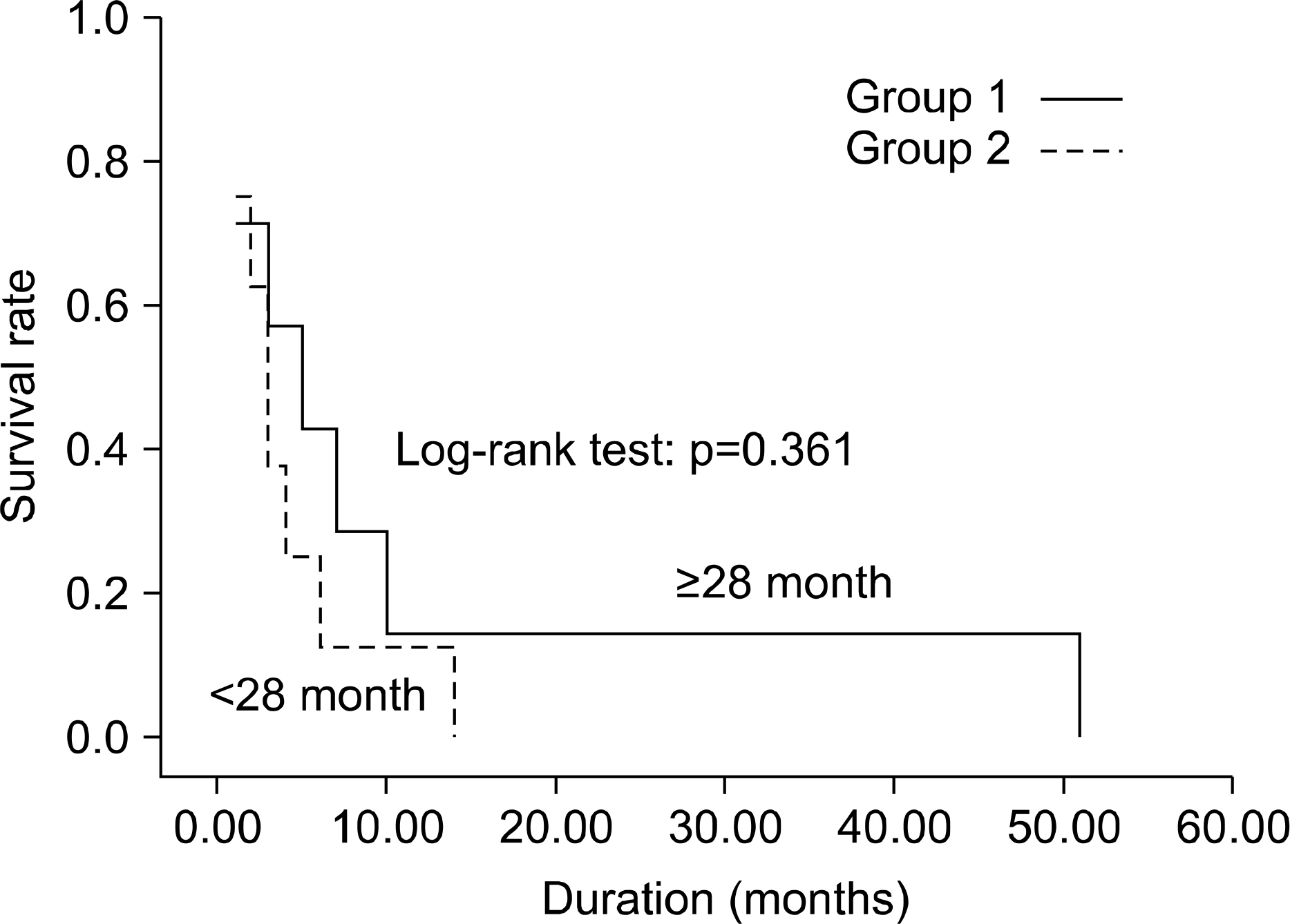Korean J Urol.
2009 Mar;50(3):224-228.
Clinical Follow-Up Study for Brain Metastases of Renal Cell Carcinoma
- Affiliations
-
- 1Department of Urology, Gospel Hospital, College of Medicine, Kosin University, Busan, Korea. rhewhy@kosinmed.or.kr
Abstract
-
PURPOSE: We reviewed the records of renal cell carcinoma (RCC) patients with brain metastases, analyzed about survival and prognosis after several palliative management.
MATERIALS AND METHODS
Between June 1998 and January 2008, 22 patients diagnosed to have brain metastases from RCC. We retrospectively reviewed their medical records, and analyzed clinical properties.
RESULTS
Of 278 patients with RCC, 22 patients (7.9%) diagnosed to have brain metastases. The pathological T stages and Fuhrman nuclear grade of RCC at the time of initial diagnosis were various (T1: 1 patient, T2: 5, T3: 8, T4: 3, Fuhrman grade 1: 0, 2: 4, 3: 10, 4: 6, unknown: 2). Most of RCC was clear cell carcinoma (17/22). Most symptoms suggesting brain metastases were neurologic. Median cancer specific survival (CSS) of WBRT, radiosurgery, or surgery group (13/22) was 4 months, conservative management group (9/22) was 1.5 months and CSS of the former group was significantly better. Median duration of development of brain metastasis after diagnosis of RCC was 28 month (1-120). There was no difference in CSS between patients with brain metastasis developed before and after 28 month (p=0.361).
CONCLUSIONS
Brain metastases of RCC have poor prognostic course. Development interval of brain metastases did not affect survival. WBRT, radiosurgery or surgery group showed better survival. Active intervention may improve survival.
Keyword
MeSH Terms
Figure
Reference
-
1.Cohen HT., McGovern FJ. Renal-cell carcinoma. N Engl J Med. 2005. 353:2477–90.
Article2.Korea Central Cancer Registry, Ministry for Health Welfare and Family Affairs. Annual report of the central cancer registry in Korea. National Cancer Center. 1988–2003.3.Harada Y., Nonomura N., Kondo M., Nishimura K., Takahara S., Miki T, et al. Cilinical study of brain metastasis of renal cell carcinoma. Eur Urol. 1999. 36:230–5.4.Dekernion JB., Ramming KP., Smith RB. The natural history of metastatic renal cell carcinoma. a computer analysis. J Urol. 1978. 120:148–52.
Article5.Pouessel D., Culine S. High frequency of intracerebral hemorrhage in metastatic renal cell carcinoma patients with brain metastases treated with tyrosine kinase inhibitors targeting the vascular endothelial growth factor recepter. Eur Urol. 2008. 53:376–81.6.Golimbu M., Joshi P., Sperber A., Tessler A., Al-Askari S., Morales P. Renal cell carcinoma: survival and prognostic factors. Urology. 1986. 27:291–301.
Article7.Middleton RG. Surgery for metastatic renal cell carcinoma. J Urol. 1967. 97:973–7.
Article8.O'dea MJ., Zincke H., Utz DC., Bernatz PE. The treatment of renal cell carcinoma with solitary metastasis. J Urol. 1978. 120:540–2.9.Lee BS., Lee JM. Brain and skull metastases in patients with renal cell carcinoma: follow-up studies. Korean J Urol. 1984. 25:441–4.10.Culine S., Bekradda M., Kramar A., Rey A., Escudier B., Droz JP. Prognostic factors for survival in patients with brain metastases from renal cell carcinoma. Cancer. 1998. 83:2548–53.
Article11.Maor MH., Frias AE., Oswald MJ. Palliative radiotherapy for brain metastases in renal carcinoma. Cancer. 1988. 62:1912–7.
Article12.Saitoh H. Distant metastasis of renal adenocarcinoma. Cancer. 1981. 48:1487–91.
Article13.Jemal A., Murray T., Ward E., Samuels A., Tiwari RC., Ghafoor A, et al. Cancer statistics, 2005. CA Cancer J Clin. 2005. 55:10–30.
Article14.Wronski M., Arbit E., Russo P., Galicich JH. Surgical resection of brain metastases from renal cell carcinoma in 50 patients. Urology. 1996. 47:187–93.
Article15.Lagerwaard FJ., Levendag PC., Nowak PJ., Eijkenboom WM., Hanssens PE., Schmitz PI. Identification of prognostic factors in patients with brain metastases: a review of 1,292 patients. Int J Radiat Oncol Biol Phys. 1999. 43:795–803.
Article16.Muacevic A., Siebels M., Tonn JC., Wowra B. Treatment of brain metastases in renal cell carcinoma: radiotherapy, radiosurgery, or surgery? World J Urol. 2005. 23:180–4.
Article17.Schoeggl A., Kitz K., Ertl A., Reddy M., Bavinzski G., Schneider B. Prognostic factor analysis for multiple brain metastases after gamma knife radiosurgery: results in 97 patients. J Neurooncol. 1999. 42:169–75.18.Wowra B., Siebels M., Maucevic A., Kreth FW., Mack A., Hofstetter A. Repeated gamma knife surgery for multiple brain metastases from renal cell carcinoma. J Neurosurg. 2002. 97:785–93.
Article19.Takeshima H., Kuratsu J., Nishi T., Ushio Y. Prognostic factors in patients who survived more than 10 years after undergoing surgery for metastatic brain tumors: report of 5 cases and review of the literature. Surg Neurol. 2002. 58:118–23.20.Lee SK., Cheon SH., Moon KH., Ahn H., Kim C. The analysis of prognostic factors of survival for patients with renal cell carcinoma according to lymph node involvement or metastasis. Korean J Urol. 2008. 49:490–6.
Article
- Full Text Links
- Actions
-
Cited
- CITED
-
- Close
- Share
- Similar articles
-
- Brain and Skull Metastases in Patients with Renal Cell Carcinoma: Follow-up Studies
- Metastases to Ureteral Stump and Bladder from Renal Cell Carcinoma
- Renal Cell Carcinoma with Double Synchronous Contralateral Adrenal Metastases
- Complete Remission of Renal Cell Carcinoma with Metastases to Lung and Bone Following Initial Interferon-alpha Immunotherapy and Adjuvant Nephrectomy
- Extremely Delayed Brain Metastasis from Renal Cell Carcinoma



